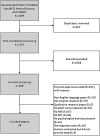Mindfulness-based interventions for psychological and physical health outcomes in cancer patients and survivors: A systematic review and meta-analysis of randomized controlled trials
- PMID: 31464026
- PMCID: PMC6916350
- DOI: 10.1002/pon.5214
Mindfulness-based interventions for psychological and physical health outcomes in cancer patients and survivors: A systematic review and meta-analysis of randomized controlled trials
Abstract
Objective: Mindfulness-based interventions (MBIs) are increasingly used within psycho-oncology. Since the publication of the most recent comprehensive meta-analysis on MBIs in cancer in 2012, the number of published trials has more than doubled. We therefore conducted a systematic review and meta-analysis of randomized controlled trials (RCTs), testing the efficacy of MBIs on measures of psychological distress (primary outcome) and other health outcomes in cancer patients and survivors.
Methods: Two authors conducted independent literature searches in electronic databases from first available date to 10 October 2018, selected eligible studies, extracted data for meta-analysis, and evaluated risk of bias.
Results: Twenty-nine independent RCTs (reported in 38 papers) with 3274 participants were included. Small and statistically significant pooled effects of MBIs on combined measures of psychological distress were found at post-intervention (Hedges's g = 0.32; 95%CI: 0.22-0.41; P < .001) and follow-up (g = 0.19; 95%CI: 0.07-0.30; P < .002). Statistically significant effects were also found at either post-intervention or follow-up for a range of self-reported secondary outcomes, including anxiety, depression, fear of cancer recurrence, fatigue, sleep disturbances, and pain (g: 0.20 to 0.51; p: <.001 to.047). Larger effects of MBIs on psychological distress were found in studies (a) adhering to the original MBI manuals, (b) with younger patients, (c) with passive control conditions, and (d) shorter time to follow-up. Improvements in mindfulness skills were associated with greater reductions in psychological distress at post-intervention.
Conclusions: MBIs appear efficacious in reducing psychological distress and other symptoms in cancer patients and survivors. However, many of the effects were of small magnitude, suggesting a need for intervention optimization research.
Keywords: cancer; meta-analysis; mindfulness; mindfulness-based cognitive therapy; mindfulness-based stress reduction; oncology; systematic review.
© 2019 The Authors. Psycho-Oncology published by John Wiley & Sons Ltd.
Conflict of interest statement
The authors have no conflict of interest to disclose.
Figures
References
-
- Noone A, Howlader N, Krapcho M, et al. SEER Cancer Statistics Review, 1975‐2015. Bethesda, MD: National Cancer Institute; 2018.
-
- Bosetti C, Bertuccio P, Malvezzi M, et al. Cancer mortality in Europe, 2005–2009, and an overview of trends since 1980. Ann Oncol. 2013;24(10):2657‐2671. - PubMed
-
- National Comprehensive Cancer Network . Distress management. Clinical practice guidelines. Version 2.2018. NCCN Guidelines. 2018.
Publication types
MeSH terms
LinkOut - more resources
Full Text Sources
Medical



